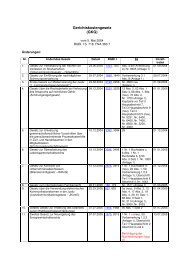Netherlands National Drug Monitor - Research and Documentation ...
Netherlands National Drug Monitor - Research and Documentation ...
Netherlands National Drug Monitor - Research and Documentation ...
You also want an ePaper? Increase the reach of your titles
YUMPU automatically turns print PDFs into web optimized ePapers that Google loves.
Ethnic background<br />
• Among secondary school-goers with a Moroccan or Turkish background, current<br />
alcohol use is significantly lower than among native Dutch pupils (8% <strong>and</strong> 19%<br />
versus 54%). Pupils with a Surinamese or Antillean/ Aruban background occupy an<br />
intermediate position (39% <strong>and</strong> 38%) (Monshouwer et al., 2008).<br />
• The quantity taken per occasion does not, however, differ between ethnic groups<br />
(Monshouwer et al., 2008).<br />
Alcohol <strong>and</strong> problem behaviour<br />
• Pupils aged 12-16 who drink on a weekly basis exhibit more delinquent <strong>and</strong> aggressive<br />
behaviour than those who do not drink every week. There is no difference between<br />
boys <strong>and</strong> girls in this respect, but the association is stronger among the younger age<br />
groups (Verdurmen et al., 2005a).<br />
• Among juveniles of 12 <strong>and</strong> 13, weekly alcohol use is linked to somatic symptoms <strong>and</strong><br />
feelings of anxiety <strong>and</strong> depression.<br />
Parents<br />
Parents can play an important role in the education of their child regarding alcohol.<br />
• Various studies have shown that establishing rules in relation to alcohol (forbidding<br />
alcohol use) can delay alcohol onset <strong>and</strong> reduce the likelihood of problem drinking<br />
(Van der Vorst, 2007; Vet & Van den Eijnden, 2007).<br />
• However, as children get older, many parents quickly become more tolerant.<br />
- Around a quarter of parents of juveniles aged 12 to 16 allow their adolescent to<br />
drink one glass of alcohol at home.<br />
- From around age 16 on, over half of adolescents say they are allowed to drink at<br />
home (Van Dorsselaer et al., 2007).<br />
The sentinel station survey on parents sheds more light on the awareness <strong>and</strong> assumptions<br />
of parents regarding substance use by their children. This survey also creates better<br />
insight into the measures taken by parents to prevent high-risk substance use by their<br />
children (Verdurmen et al., 2008).<br />
• In 2007, parents of secondary-school children had a good idea of whether their<br />
child was sometimes drinking. However, parents typically underestimate the amount<br />
of alcohol consumed. On average, adolescents drink three times more during the<br />
weekend than their parents believe.<br />
• The number of drinks taken by adolescents at the weekend is closely linked to the<br />
drinking behaviour of their parents. The more the parents drink, then the more the<br />
children are likely to drink as well.<br />
• Virtually all parents believe that it is harmful for the under sixteens to take one or<br />
two alcoholic drinks on a daily basis (95%), or to consume five or more drinks every<br />
weekend (95%).<br />
• Over half of parents (55%) believe it is harmful for the under sixteens to drink one or<br />
two units of alcohol every weekend, <strong>and</strong> nearly half think the opposite (45%).<br />
148 <strong>Netherl<strong>and</strong>s</strong> <strong>National</strong> <strong>Drug</strong> <strong>Monitor</strong> - NDM Annual Report 2009




